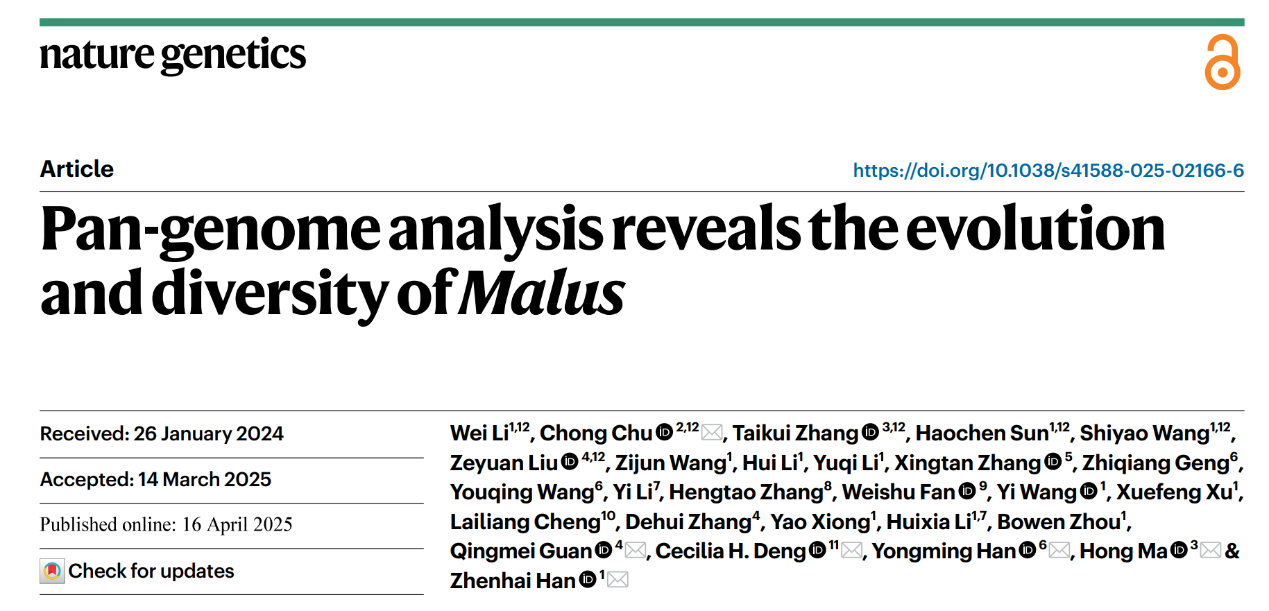Recently, Professors Han Yongming, Wang Youqing and Geng Zhiqiang from our college, in collaboration with domestic and foreign research institutions such as China Agricultural University, Harvard University in the United States, Pennsylvania State University in the United States, Northwest A&F University, and the Royal Institute of Plant and Food Research in New Zealand, published in "Nature Genetics" (IF=31.8, Chinese Academy of Sciences /JCR) In the first zone, important research results were published, systematically revealing the evolutionary trajectory of the genus Malus over tens of millions of years and constructing the first graphical pan-genome of the genus Malus. As one of the co-corresponding units, our college has provided significant support for the genomic analysis and interdisciplinary cooperation of this research.

Plants of the genus Malus have complex ploidy and are distributed across multiple geographical regions such as Eurasia and the Americas. They are an important group of woody plants for studying genomic polyploidy and hybridization. Wide Genome Doubling (WGD) is an important driver of species differentiation. However, the impact of recent WGD events in cultivated apple (Malus domestica) on other species of the genus remains unclear, and the evolutionary relationships of the interspecific genomes need to be systematically analyzed. As an important temperate fruit tree, the genetic basis for cultivating apples is relatively narrow, mainly relying on a few closely related varieties, which leads to severe challenges for them in responding to environmental changes and pest and disease control. Therefore, systematically mining and utilizing the genomic resources of wild apple plants is of great scientific significance and application value for deeply understanding the evolutionary history of this genus of plants, analyzing the genetic basis of important agronomic traits, and cultivating superior varieties with wide adaptability and stress resistance.
The research team, through sequencing and assembling 30 high-quality genomes of Malus plants, for the first time constructed a graphical pan-genome of Malus, and analyzed its complex polyploidization, ancient hybridization events and the formation mechanism of genetic diversity. This achievement was evaluated by "Nature Genetics" as a "milestone in the study of the genus Malus", providing key theoretical support for precise breeding of fruit trees. Professor Han Yongming from our college, as one of the co-corresponding authors, and Professors Wang Youqing and Geng Zhiqiang, as key participants, have played a significant role in the construction of genomic evolution models, cross-species gene penetration analysis, structural variation analysis, and gene function prediction through cross-university collaborative innovation. This has strongly supported the research's leap from single-trait analysis to systematic evolution research. It demonstrates our institute's ability to integrate industry, academia and research in the field of agricultural biotechnology, and contributes the wisdom of Beihua to serving the national seed industry revitalization strategy.
The achievement of this research result marks an important progress made by the College of Information Science and Technology of Beijing University of Chemical Technology in the interdisciplinary field of computer application technology and bioengineering in agricultural science and technology.
